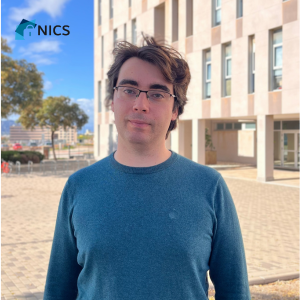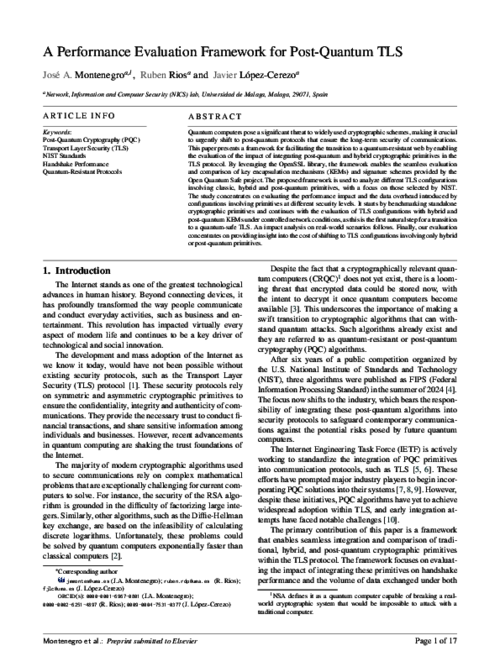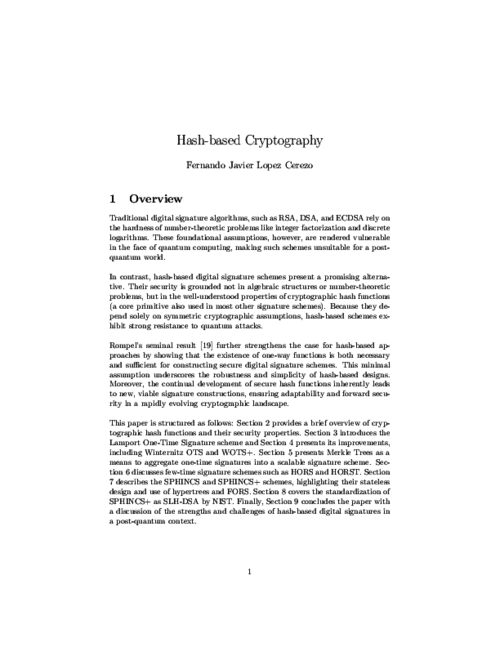F. Javier López
tech & mngt staff
Edificio de Investigación Ada Byron
C/ Arquitecto Francisco Peñalosa, nº 18
Ampliación Campus de Teatinos. Universidad de Málaga
29071 Málaga (Spain)
Phone: +34 951 952 936
E-mail: lopezalhaurin@uma.es
Publications
Jose A. Montenegro, Ruben Rios, Javier Lopez-Cerezo
A Performance Evaluation Framework for Post-Quantum TLS
In: Future Generation Computer Systems, vol. 175, no. 108062, pp. 1-14, 2026, ISSN: 0167-739X.
@article{Monte2025pqc,
title = {A Performance Evaluation Framework for Post-Quantum TLS},
author = {Jose A. Montenegro and Ruben Rios and Javier Lopez-Cerezo},
url = {/wp-content/papers/Monte2025pqc.pdf},
doi = {10.1016/j.future.2025.108062},
issn = {0167-739X},
year = {2026},
date = {2026-02-01},
urldate = {2026-02-28},
journal = {Future Generation Computer Systems},
volume = {175},
number = {108062},
pages = {1-14},
publisher = {Elsevier},
abstract = {Quantum computers pose a significant threat to widely used cryptographic schemes, making it crucial to urgently shift to post-quantum protocols that ensure the long-term security of communications. This paper presents a framework for facilitating the transition to a quantum-resistant web by enabling the evaluation of the impact of integrating post-quantum and hybrid cryptographic primitives in the TLS protocol. By leveraging the OpenSSL library, the framework enables the seamless evaluation and comparison of key encapsulation mechanisms (KEMs) and signature schemes provided by the Open Quantum Safe project. The proposed framework is used to analyze different TLS configurations involving classic, hybrid and post-quantum primitives, with a focus on those selected by NIST. The study concentrates on evaluating the performance impact and the data overhead introduced by configurations involving primitives at different security levels. It starts by benchmarking standalone cryptographic primitives and continues with the evaluation of TLS configurations with hybrid and post-quantum KEMs under controlled network conditions, as this is the first natural step for a transition to a quantum-safe TLS. An impact analysis on real-world scenarios follows. Finally, our evaluation concentrates on providing insight into the cost of shifting to TLS configurations involving only hybrid or post-quantum primitives.},
keywords = {},
pubstate = {published},
tppubtype = {article}
}
Quantum computers pose a significant threat to widely used cryptographic schemes, making it crucial to urgently shift to post-quantum protocols that ensure the long-term security of communications. This paper presents a framework for facilitating the transition to a quantum-resistant web by enabling the evaluation of the impact of integrating post-quantum and hybrid cryptographic primitives in the TLS protocol. By leveraging the OpenSSL library, the framework enables the seamless evaluation and comparison of key encapsulation mechanisms (KEMs) and signature schemes provided by the Open Quantum Safe project. The proposed framework is used to analyze different TLS configurations involving classic, hybrid and post-quantum primitives, with a focus on those selected by NIST. The study concentrates on evaluating the performance impact and the data overhead introduced by configurations involving primitives at different security levels. It starts by benchmarking standalone cryptographic primitives and continues with the evaluation of TLS configurations with hybrid and post-quantum KEMs under controlled network conditions, as this is the first natural step for a transition to a quantum-safe TLS. An impact analysis on real-world scenarios follows. Finally, our evaluation concentrates on providing insight into the cost of shifting to TLS configurations involving only hybrid or post-quantum primitives.
Fernando Javier Lopez Cerezo
Quantum Key Distribution
NICS Lab Technical Report, 2025.
BibTeX | Links:
@techreport{fjavierlc2025b,
title = {Quantum Key Distribution},
author = {Fernando Javier Lopez Cerezo},
url = {/wp-content/papers/fjavierlc2025b.pdf},
year = {2025},
date = {2025-02-06},
urldate = {2025-02-06},
institution = {NICS Lab},
type = {Technical Report},
keywords = {},
pubstate = {published},
tppubtype = {techreport}
}
Fernando Javier Lopez Cerezo
Hash-based Cryptography
NICS Lab Technical Report, 2025.
BibTeX | Links:
@techreport{fjavierlc2025a,
title = {Hash-based Cryptography},
author = {Fernando Javier Lopez Cerezo},
url = {/wp-content/papers/fjavierlc2025a.pdf},
year = {2025},
date = {2025-02-06},
urldate = {2025-02-06},
institution = {NICS Lab},
type = {Technical Report},
keywords = {},
pubstate = {published},
tppubtype = {techreport}
}





